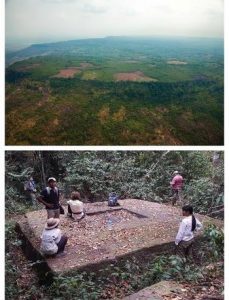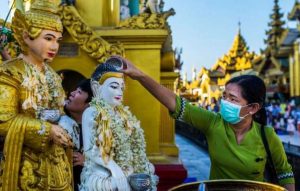Is organized religion in Japan, including the country’s most venerable Buddhist institutions, on a path from which there is no return? A respected business weekly in circulation since 1895, the Weekly Toyo Keizai (Shūkan Tōyō Keizai), has published a leading article, titled “Religion’s Crisis of Disappearing” (宗教消滅危機), on the fading role of religions in Japan and their potential demise—or at least irrelevance—in the future. The article is dated 10 June.
This comprehensive, 32-page feature in the business weekly, which is aimed at executives, entrepreneurs, and investors, outlines how a “life or death struggle” is unfolding among the Buddhist community. Written by reporter Daiki Nonaka, the article lays the blame on a nexus of complex and potentially irretrievable problems: Japan’s declining birth rate and the double blow of an aging population, the depopulation of traditionally religious areas, the simplification of funerary rites (accelerated in the wake of the pandemic), and public scandals surrounding both traditional temples and lay religious groups.
Written in two parts—although the online version of the Weekly Toyo Keizai’s article is divided into three sections—each segment which is split into sub-sections, focuses on different factors for the long-term decline of organized religion in Japan. Part One outlines the depopulation of traditional areas of religiosity and scandals around older establishments, such as the embezzlement of temple funds. Furthermore, striking statistics around the collapse of favor for elaborate funerals, coupled with increasing competition among the funerary industry, has meant less business for temples. Part Two looks at the decline of so-called “new religions,” with separate parts devoted to the Buddhist lay organization Soka Gakkai, the Unification Church—which itself came under scrutiny following the assassination of ex-PM Shinzo Abe on 8 July 2022—the Jehovah’s Witnesses and Happy Science. (Japan Today)
For the past few decades, the temples’ reliance on funerals to keep afloat had fed into negative stereotypes of Buddhism as unconcerned with the real lives of real people: the Japan Buddhist Federation and Daiwa Securities, once jointly conducted a survey that exposed “how infrequently priests are called upon to cater to parishioners’ spiritual needs.” (Japan Today) The pandemic led to an overall reduction of funeral costs, as well as procedures with internet-based operators like Kamakura Shinsho and others eating into the business of temples. Powerful business interests like Japan Agricultural Cooperatives, four private railway companies, and three hotel groups have made things that much more difficult (Japan Today). Buddhist otsuya (wakes) were already among the few consistent revenues of Japanese temples (which also made them targets of derision as funerary businesses). Now the pandemic has spurred many Japanese people to adopt “single ceremony” funerals, with the Buddhist wakes being the first to be cancelled.
The pastoral front has been decimated as well. Despite conversations in the media and broader society about the need for greater awareness around mental health, encounters between practicing Buddhists and priests at family temples have continued to drop. Consultations over personal or spiritual matters are at a catastrophically low 0.7 per cent. Even during festivals or funerary occasions, where Buddhist priests are supposedly more visible, the numbers are far from encouraging: 50 per cent for memorial services and funerals, 26.8 per cent during Obon, the festival for the dead, and 25.8 per cent during visits to family graves. (Japan Today)
The article emphasizes that the crisis cuts across all faith traditions, from Shinto to Buddhism to Christianity. The deteriorating situation comes amidst a backdrop of declining religion overall, with a 2015 prediction by Prof. Kenji Ishii of Kokugakuin University, that more than a third of Japan’s official religious institutions (hojin; incorporated religious bodies) will no longer exist by 2040 (Japan Today). As recently as April this year, a major temple in Tokyo, the Tsukiji Hongan-ji, conducted a survey on religious trust among 1,600 people. 39.7 per cent of those interviewed said that their sense of trust had declined over the last two years (South China Morning Post). While there was slightly good news in the sense that only 10 per cent said that they felt uncomfortable with Buddhism, 35 per cent surveyed said that they felt uncomfortable with religion in general. The demographic crisis could not be more glaring in the fact that most respondents younger than 60 said that they had “no reason” to visit a Buddhist temple. (South China Morning Post)
Overall, the picture looks extremely grim for Buddhist institutions in Japan. For the past couple of decades, several temples have attempted to stay relevant by adopting certain “gimmicks” like appealing to fans of anime and manga, and in recent years some have joined the conversation about AI and robotics, even entering into research collaborations with universities. But the downward trend seems irrevocable without a radical reorientation in the very role that Buddhist institutions perceive to play – and are perceived to play – in society. The scale and ambition of this reorientation may require unified action across multiple groups and factions, something that temple politics might deny or hobble.
See more
Is religion in Japan in irreversible decline? (Japan Today)
1.5億円税務事件の背景にある「寺院存亡危機」 (Japanese only) (Weekly Toyo Keizai)
「家」に立脚した宗教は多死社会でも出番なし (Japanese only) (Weekly Toyo Keizai)
伝統仏教は現代人の不安に寄り添えているか (Japanese only) (Weekly Toyo Keizai)
Is Japan losing its religion? Cults, Unification Church scandal seen driving rising distrust (South China Morning Post)
Related news from BDG
Mourners Bid Farewell to Japan’s Shinzo Abe at Buddhist Temple
Related features from BDG
Rebirth and Revolution – Engaged Buddhism in Japan: A Conversation with Jonathan Watts















